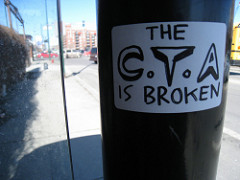
Good reporting from Wirepoints, based on articles from Reason and Pro Publica, about the City of Chicago pushing low-income motorists into bankruptcy. These sources focus on the twin injustices of punitive ticketing and fines, and aggressive impoundment of innocent motorists’ cars. Of course parking restrictions, liability insurance requirements, and traffic rules need to be enforced, but it’s pretty clear that Chicago Police and other municipal actors see this as a source of revenue to pay their salaries and pensions, more than as an enforcement mechanism. The statistics imply a racist motive as well.
But that’s not the point. The point is, why do people with low incomes need to own cars? Why can’t they get where they need to go by transit? The answer, of course, is that in most affordable neighborhoods transit is sparse: Buses run slowly and infrequently, and quit early. Rail is only a bit faster, and most lines also lack 24-hour service. Relatively few jobs are reliably accessible within an hour, or even two hours travel time. And with the demise of neighborhood retail, cars are almost essential for shopping. Schools, libraries, other government facilities have large free parking lots even it they’re poorly-located for transit and pedestrian access. So of course people who can’t afford to own and operate automobiles find they’re compelled to have them.
This doesn’t justify the municipality stealing money and property from residents already living on the economic edge. It just makes it worse.

